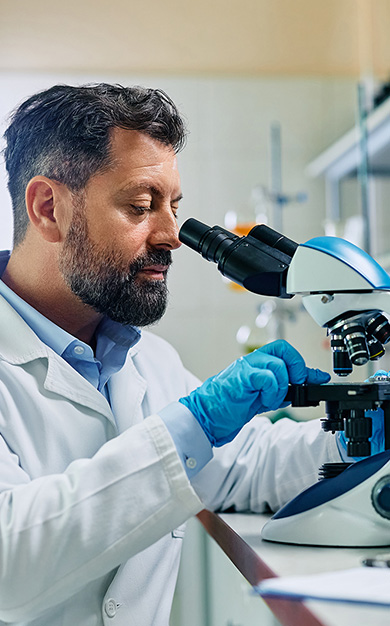Coronavirus & AMD: Your Questions Answered
Featuring
Michael B. Gorin, MD, PhD
Ophthalmologist from UCLA
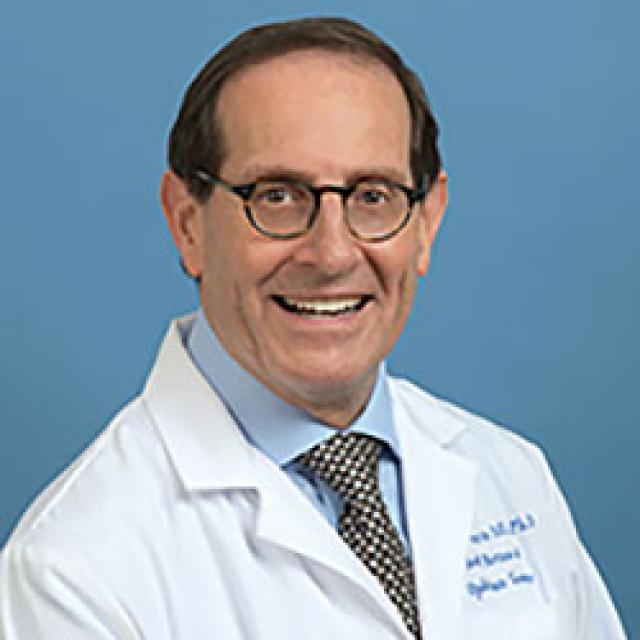

Michael B. Gorin, MD, PhD
Ophthalmologist from UCLA

This telephone discussion features Michael B. Gorin, MD, PhD, an ophthalmologist from UCLA who is devoted to research and clinical care of hereditary retinal disorders, especially age-related macular degeneration, retinal dystrophies and other medical retinal conditions.
Watch a video of the Chat:
MICHAEL BUCKLEY: Good afternoon. I’m Michael Buckley with the BrightFocus Foundation. Welcome to today’s BrightFocus Chat, “Coronavirus and AMD: Your Questions Answered.” While we just did a Chat 2 weeks ago, we scheduled this special edition today because of the coronavirus pandemic. Let me tell you about BrightFocus and what we’ll do today. BrightFocus Foundation funds some of the top researchers in the world. We support scientists who are trying to find cures for macular degeneration, glaucoma, and Alzheimer’s.
We share the latest news from these scientists with families that are impacted by these diseases. We have a number of free publications and plenty of materials at our website, www.BrightFocus.org, that offer tips on how to live with diseases such as macular degeneration. BrightFocus Chats are one way of sharing this information. And now, let me introduce today’s guest. We’re very fortunate to have Dr. Michael Gorin from UCLA—the University of California, Los Angeles—with us today. Dr. Gorin is one of the leading experts in the country on age-related vision disease, particularly macular degeneration. So, Dr. Gorin, I’d just like to thank you for joining us today. I was wondering if you could just start off and tell us a little bit about what you do at UCLA.
DR. MICHAEL GORIN: I’m a professor in the Division of Retinal Disorders and Ophthalmic Genetics in the Department of Ophthalmology at UCLA and the Jules Stein Eye Institute. I’m a clinician-scientist and have had a research laboratory for more than 30 years, as well as seeing patients. With respect to BrightFocus, I am a former recipient of a BrightFocus grant for my research, which was very key in initial discoveries of the molecular genetics of age-related macular degeneration, and I currently remain active with the BrightFocus Foundation as the co‑chair of the Scientific Advisory Committee for the Macular Degeneration Research Grant Program, which continues to fund leading scientists—both in the United States and around the world—to better understand the causes and also potential treatments for age-related macular degeneration.
MICHAEL BUCKLEY: Great. Just kind of a career day question: How did you end up in health care and science?
DR. MICHAEL GORIN: Well, I am the product of an ophthalmologist. My father was an ophthalmologist and ear, nose, and throat specialist, and always I was intrigued with medicine and the eye. I probably made the conscious decision to become a physician in about fifth grade and pursued studies in college. Eventually I went on and got my Ph.D. in biochemistry and my medical degree at the University of Pennsylvania and then went on and did a fellowship in hereditary retinal disorders in Medical Retina at Moorfields Eye Hospital, which is the preeminent eye hospital in England and in Europe. I was then at the National Eye Institute after that for several years before going to the University of Pittsburgh and continued there doing both genetics and ophthalmology until I came to UCLA.
MICHAEL BUCKLEY: Just a big picture question that I think is on listeners’ minds today; we’ll get into this in more detail over the next half-hour or so. How does the coronavirus impact vision health, particularly AMD?
DR. MICHAEL GORIN: In general, the COVID disease due the SARS-coronavirus-2 doesn’t do very much to the eye. It is known that some patients have presented…very few, but a few have presented with conjunctivitis or a surface inflammation of the eye—not inside the eye, not affecting the retina. There have been no reports of age-related macular degeneration being worsened or triggered by the coronavirus. However, in preparation for this Chat today, I did do some research about: What are the processes that occur when a person gets a coronavirus infection, and what does it do to their body? And there’s no question that there’s a tremendous activation of the immune system, and in fact, much of the illness that a person experiences is not from the infection itself but the body trying to attack the virus. Those processes that the virus activates—the inflammatory pathways—are related to macular degeneration in some sense.
And so, it is possible that there may be some relationship, either possibly some worsening or increasing the frequency or severity of the disease, but we have no data for that at this time. No one has done any studies. We’re too much caught up in the emergency of just trying to deal with saving people’s lives and getting them to recover. But there is reason to believe that we might find something later on in terms of…people who have macular degeneration may be more prone to severe complications from the coronavirus. I would certainly caution my AMD patients to be especially careful, and it may have some impact, but we haven’t seen that clearly yet.
MICHAEL BUCKLEY: Well, great. Thank you. A number of questions that have already come in kind of center around the core question of: What should I do now? People are wondering, how do you balance the risk of vision loss versus the risk of COVID? So, the big picture: Should people keep their appointments for treatments and checkups, or should people spread those out or skip them altogether?
DR. MICHAEL GORIN: It’s a very individual thing. It turns out that the American Academy of Ophthalmology has recommended that all ophthalmologists see only urgent and emergent cases. Personally, at the UCLA, we are keeping all of our clinics going, and we have pushed those patients who are being seen every 6 months or a year to longer-term follow-ups. However, for all of my patients, certainly, who are being treated for age-related macular degeneration, anybody who is being seen at an interval of either every 4 months or more frequently, we are still seeing them because that frequency of visits—three to four times a year—is done for individuals who have fairly active disease or are under active treatment.
Many patients receive injections monthly. For those patients, the decision to defer an injection or not or to defer an evaluation to see if they need an injection is really dependent on a lot of factors, and I’ve actually encouraged my patients to contact us and speak with me personally through telephone or video conferences to decide whether or not it’s important enough for them to come in. Most of my patients receiving regular injections, they really do need to come because the chance of having deterioration of vision that will not be reversible by delayed injections is a real concern. What factors enter into that? I hope you’ll give me just a few moments to talk about that, because it varies with every person.
First of all, it depends how frequently you’ve been getting injections. A person who’s been receiving injections every month, presumably their doctor has decided that their disease is active enough that it requires the maximal frequency of being treated, and I’m pretty sure that those people still need to be seen. People who are on a treat-extend approach—where it’s for longer intervals—they may be able to extend those intervals by some amount, but if it’s less than 3 months or even less than 4 months, they probably can’t extend it very far without running the risk of having recurrent activity, and we know that when you treat people when they have already leakage and bleeding from the wet form of macular degeneration, that leads to a downward decline in their vision.
Now, other factors that come into this are: What is the vision in your other eye? If your doctor is treating an eye that’s, let’s say, 20/60 or 20/80 and your other eye is 20/20—and that depends a little bit on other parameters, because some people have 20/20 vision that’s still pretty compromised by geographic atrophy—but if one eye is much better than the other and you’re treating the poorer-seeing eye, you might be willing to kind of go a little bit longer, realizing that there is some risk, but the downside is fairly small. On the other hand, if this is your better eye or your only eye with which you have good sight, then waiting becomes more of a concern. You really want to prevent any further deterioration, and you should be going in for your visit.
So, as you can see, there are multiple factors. There’s the vision of the eye that’s being treated, the frequency you’ve been treated at this point. What is the status of the other eye? Are both eyes being treated? And by the way, I would say those of you who are having both eyes treated but not on the same visit may wish to consult with the doctor about combining the treatment for both eyes at the same visit. That would limit your exposure of going in repeatedly and also having someone taking you in. So, that’s an option that one should explore with their physician. In my practice, I routinely will treat both eyes. We have a protocol in place to minimize any potential contamination between the two eyes while doing this, so we feel that it’s very safe, but there are doctors who really only insist on treating one eye per visit, and that may be something they want to reconsider. So, this is a very individual thing, and of course, obviously, how difficult it is for you to get in may be a factor, as well.
MICHAEL BUCKLEY: Sure. So, that’s great. I appreciate that, and there’s definitely a number of points there that we’ll be talking about over the coming minutes. Dr. Gorin, one question that we received from several people is they know…they hear over and over again, try not to touch your face, try not to touch your eyes. Well, I guess it’s a two-part question. Can you get the infection through your eye, and also what about people who need to use eye drops or contact lenses? The big picture is: Is the eye an entry point for the virus that we should be concerned about?
DR. MICHAEL GORIN: There is a report of one ophthalmologist who is alleging that he contracted the COVID infection from a patient who had conjunctivitis. We don’t know of any cases of…so, I guess it is theoretically possible. The best thing to do, obviously, when it comes time to put in your drops is wash your hands thoroughly before you do it yourself. Ideally, it would be nice if you could wipe down the outside of the bottle just briefly with a disinfectant because they may have been handled by you or someone else in the house previously; make sure that they’re dry, though, because you don’t want any disinfectant dripping into your eye while you’re administering your drops. Administer your drops and put them away; ideally, putting them in a place where no one’s going to touch them again until you need to use them again would be also helpful. We do want you to continue using your eye drops if they’ve been prescribed, because in many cases, patients who have macular degeneration also have elevated pressure in the eye that needs to be treated with medication, and they may be taking it for other reasons, as well. So, we don’t want you to stop your eye drops, whether you have macular degeneration or not.
MICHAEL BUCKLEY: Great. I appreciate that. I appreciate your main point about individual…talk to your individual eye care professional to figure out the best course of action. For people that can go longer without visits, how should they best take care of their vision at home? Are there ways to monitor their vision or lifestyle/diet tips that can help people during some extended periods between appointments?
DR. MICHAEL GORIN: Okay, so let’s talk about screening in terms of: What can you do at home to check what’s going in your eye? There are some apps on iPhone and other smartphones. They’re not great. I mean, you can get a download of an Amsler grid. Many of you know what that is. That’s a piece of paper that has lines with a dot in the center, and you use one eye to try to look for distortions. There is an app that I tried out just the other day because I’ve been struggling with this for my own patients, which uses what’s called a hyperacuity test, but I found it…it was actually very clever, but the problem was it didn’t tell you, as the patient, what’s really going on. It’s supposed to send the data to the doctor, and over time the doctor sees that there’s a change. And that’s really very challenging for, first of all, doctors to set that up for all of their patients. There is a device—which I don’t think you’ll be able to get in the short term, but we probably should be using more—called ForeseeHome, which uses a hyperacuity measurement technique. It’s a device that sits on a countertop, and it actually runs you through a test to see if there are changes in your vision.
But for most of us, I would say, here’s the best advice I can give you: You want to have a situation where you are pretty routine, where you’re sitting where you watch TV or some other thing, cover one eye, and look at something that you know is familiar to you, like the TV screen and the banner—that chyron that goes along the bottom—and see if that’s changed. Are you able to see it with more difficultly than before, or do you see new distortions on the TV that were not present before? You have to check each eye separately. Unfortunately, for some patients, it’s not as good as what we can do in the office with the imaging technologies that we have. I mean, quite honestly, my goal when I see patients is to identify either worsening or recurrent wet macular degeneration before the patient does so that we can treat them before it has a negative impact on their vision. Obviously, if you’re screening for a vision change, you’re not as sensitive as that technology, but that may be the best you can do. I would say, again, if you’ve been treated frequently and this is your better-seeing eye, I would tend to encourage you to go for regular visits rather than just relying on screening. But you can at least, in other circumstances, monitor your vision to some extent by how well you can read small print, but you want something that’s standard each time so that you tell if there’s a change.
MICHAEL BUCKLEY: Interesting, and I appreciate that. And to our listeners, we’ve talked about the Amsler grid and the ForeseeHome a few times in the past, and BrightFocus has Amsler grids that we can mail out to you. And the ForeseeHome device, am I correct, Dr. Gorin, is something that Medicare and other insurance may cover?
DR. MICHAEL GORIN: Medicare does cover it. It usually requires that the doctor be a participating physician so that they’re getting the reports from the machine for the patient. There’s only…not many doctors have adopted it. I think if we had anticipated this situation earlier, it might have been a good option for some of our patients because it is more sensitive than the Amsler grid at picking up changes.
MICHAEL BUCKLEY: That’s good to know. So, for people who are monitoring at home, what happens if there is an emergency? Do most practices shut down, and they would have to go to an emergency room, which people would understandably have concerns about? What happens if somebody has an emergency related to macular degeneration over the next couple of months?
DR. MICHAEL GORIN: Well, I’m sure it varies in different places of the country. As I said, at UCLA, our department is open for business. We are still seeing patients; we even see new patients. I have patients who come quite a far distance, and a few of them have said it’s too hard for them to travel under these current shelter and restrictions, and I’ve been arranging for other doctor’s offices to take over for me who live closer…who are closer to where the patients live. Going to an emergency room is not ideal, because they’re not really set up to do the ocular imaging that is so helpful to guide what we do, nor do they have the drug necessarily readily available—whichever anti-VEGF medication your doctor is using. As you know, we have four of them now. So, it’s best to call your retina specialist and ask them: Do they have hours, and where are they sending patients if they are not seeing them? But it’s preferable to do that.
Now, the one question that comes up is, “Well, what happens if I have symptoms of coronavirus? What if I have a cough and a fever and I see a change in my vision? Or I’m supposed to go for a regular visit, and I have those symptoms. What do I do?” Okay. Those individuals who either are suspicious that they have the coronavirus infection or know that they have it or have symptoms that are of concern, first, they should call the office before coming in—first and foremost. They need to know. They may defer you for a week or two to see that you’re getting better. Again, in some places, for example, at UCLA, we’re setting up a clinic in the hospital specifically for those patients so that they can be seen separate from the rest of our clinic so that they’re not exposing the rest of our population. That’s one reason why coming to our clinics are relatively safe. We prescreen all patients before they come in, and we ask patients to take suitable precautions. But for those people who have symptoms, they may very likely have to defer getting their injection and it may be unavoidable.
On the other hand, if you’re well and you’re due for an injection, how fearful should you be about going to your eye doctor’s office? The answer is: If the office has implemented a good screening program, is keeping patients far away from each other, is limiting contact, I think it’s really very safe, and you can have reasonable confidence there going in. We clean the room and equipment after every patient that is seen. Our waiting rooms have been emptied out of the nonurgent patients so that the people are not waiting in the rooms next to each other. We try to room them as quickly as we can. We get the tests done and the pretreatments done much faster than we usually do. I know many patients complain about how long they spend in an eye doctor’s office, and that’s partly because we do so much when we see a patient. But because we’ve reduced our volume, many of us have been able to streamline that process and keep the visit times fairly short.
MICHAEL BUCKLEY: That’s great. That’s a lot of reassuring details for our listeners. Dr. Gorin, earlier you mentioned telemedicine, and I think for many Americans, that’s not something they have a lot of experience with. I was wondering if you could tell us a little bit about how telemedicine works. How does the patient participate? Is this something from a cybersecurity and HIPAA standpoint that is safe? I was wondering if you could just tell us a little bit about what it is and how it works.
DR. MICHAEL GORIN: Telemedicine generally involves using both video and audio to communicate with the patient and to be able to transmit both physical findings that the patient has, as well as engage in a dialogue with the physician. The challenge in ophthalmology is that we obviously need…often we rely very heavily on high-tech imaging technologies to look at the retina for macular degeneration to make decisions about treatment and the like, and we can’t do that by telemedicine.
I’ve actually used telemedicine for a couple of years, because I use it routinely for my patients who have genetic eye problems and we’re doing counseling, but now more and more people are doing it. But, for example, in discussing whether you’re having these symptoms or whether you should come in for the injection, a telemedicine visit may give you the opportunity to have a dialogue with your physician in order to know if this is a situation that really warrants you to take the risk to come on in, or can you safely defer? Now, there are patients who will tell you, “Well, my vision is so poor, I really can’t see much benefit of my seeing the doctor’s face.”
I agree they have loosened the regulations about doing phone consultations, so doctors now who previously would not do phone consultations because they were not being reimbursed by insurance and by Medicare have gotten a clearance to do that. So, some—but perhaps not all—doctors will offer you that service to a greater extent than in past. I mean, presumably, you’re always able to talk to your doctor, but I don’t think many people realize that that’s a time and effort that is not generally paid for by Medicare or insurance, but that has changed under this current epidemic.
MICHAEL BUCKLEY: Does somebody need to have an app or anything on their phone or computer in order to do telemedicine? From the patient’s standpoint, I mean.
DR. MICHAEL GORIN: At UCLA, you do. You have to be subscribed to the myUCLAhealth. You have to have gone through a consent process, and you have to basically use either a computer with a camera or a smartphone in order to do this. There are instructions that are provided prior to the appointment by our staff, and I’m sure that other centers do this, as well. Now, do all doctors’ offices offer this? I don’t know. It’s actually easy enough for people to set up by other conferencing measures such as Zoom. Actually, UCLA uses a version of Zoom built into the electronic medical records system, but that…again, different doctors and different offices operate with different platforms, and you have to find out what they offer. You can’t just assume that you’ll make an appointment and it will be 1-2-3. That’s one of the challenges. It requires a little bit more tech-savvy than many of our older patients are used to.
MICHAEL BUCKLEY: These are one of many, many challenges people are facing, but I appreciate you kind of walking through how that works. Just turning to the topic of vision health in general, we’ve all tried to get the message out that Americans should have a very regular, perhaps annual, comprehensive eye exam. What happens to this advice now? If somebody is not seeing any front-burner problems with their eyes but yet they know they’re supposed to get a very regular eye exam or it’s time to get a new prescription for glasses or contacts, what does someone like that do in this current climate?
DR. MICHAEL GORIN: Those are the patients that we are encouraging to defer coming at this time, partly to reduce the volume of load in our clinics and lessen their exposure—as well as ours, quite frankly. Doctors and health care professionals are among the highest risk groups for getting coronavirus now, and we worry about the more people that we’re in contact with, not only does our chances go up, but we have the chance that if we get infected, we would pass it to others. But we take a lot of steps.
So, I would say to somebody, if it’s not urgent, you have no history of uncontrolled glaucoma, you have no history of macular degeneration, you’re doing it just for routine eye care, or that you have mild cataracts and it hasn’t affected your vision enough that you need surgery, this is the time to wait. And I would tell you just to call the office and make an appointment for several months from now until we get past this really terrible time.
MICHAEL BUCKLEY: Very understandable. We have a question. Now that we’re all spending so much time at home, how do we manage our eye health well when we’re all at home so much, whether that’s watching the TV or screen time or a lot of snacking, the lighting around the house? What can we do during the coming weeks—and perhaps months—that we’re at home?
DR. MICHAEL GORIN: Well, for age-related macular degeneration, this is a complex condition that’s partly caused by a combination of genetics and lifestyle—diet and smoking exposure. Obviously, we want people to continue to eat healthy. For those who are taking the AREDS2 supplements for macular degeneration, we would encourage you to continue taking those. We also want to you to have a balanced diet.
It’s hard to exercise, but if you can find some way to do things, either in your home or take short walks outside with social distancing away from people, that is healthy—all things to maintain your mental status. In terms of whether or not you should limit your time on visual devices or reading, there is no evidence that macular degeneration is worsened by using your eyes. The analogy I tell people: It’s a little bit like having your TV on. Your eyes are on all the time. Now, whether you watch the TV or not, it’s not going to affect how the TV is going to wear out, and similarly, using your eyes to read or to watch TV or to work on your phone or your computer is not going to wear out your eyes; it’s not going to damage your retina.
So, I would encourage you to just continue whatever activities help you maintain your mental health and use your vision as best you can. If you are limited in your vision so you cannot use those diversions as well, I really strongly recommend that you find other means, such as podcasts, listening to music, talking on the phone with people to stay mentally engaged, and to listen to the radio—I guess there’s still radios out there—to stay connected with the world, to stay informed, and not just be sitting around doing nothing.
MICHAEL BUCKLEY: Those are great points, I think, for people of all ages. I have a question from your home state of California. She asks, “What happens to macular degeneration research during this time?” “Does research on AMD continue, or what’s the impact on science with the coronavirus on vision science?”
DR. MICHAEL GORIN: There’s been a huge impact on science throughout every disease, every field. I mean, huge resources are going into work on the coronavirus itself to understand why people have more severe disease, whether we can come up with treatment, better diagnoses and things. But basically, almost all other clinical research for other diseases has been very much put on hold or delayed. For example, clinical trials have been very much impacted, because we’re telling the patients not to come in for their research visits. Enrollment into new studies has been postponed because we can’t bring people in. Our research laboratories have been shut down at the university, except for experiments that would be devastating if they were not finished, in terms of cost or resources.
Sometimes we’re in the midst of doing studies where, if we stop now, we’ll lose everything that we’ve done for several years. The university has evaluated on a case-by-case basis to decide what experiments to continue, and the rest of the activities of that laboratory are prohibited. So, there’s been a huge impact. I don’t think in the long term it’s going to be a disaster, but obviously, for those who are urgently waiting for new treatments in things like this, this is going to have some impact in the short term.
MICHAEL BUCKLEY: I appreciate that. I think it’s a difficult reality. So, Dr. Gorin, before we conclude…
DR. MICHAEL GORIN: Before you conclude, one thing. I’m looking at the questions that people have put in, and there’s one that I do want to address.
MICHAEL BUCKLEY: Oh, great.
DR. MICHAEL GORIN: Okay. One person asked about chloroquine and hydroxychloroquine, which are being talked about a great deal for coronavirus, and those who are taking them now…they a very commonly used medications for patients with autoimmune diseases. This individual is very much aware of the fact that Plaquenil, which is hydroxychloroquine, can cause damage to the central part of the retina or the macula, and is that a serious issue in this case? We’ve never found evidence that patients with macular degeneration were necessarily worsened by taking hydroxychloroquine, but we actually try to avoid it because it’s very hard to assess. The amount of treatment that they’re offering and the duration of using hydroxychloroquine in the clinical trials going on are too short of a period for most patients to really experience any retinal damage. The vast majority of people who have toxicity from that drug that affects their retina have been on the drug for a substantial period of time and on a sustained dose, and that’s not the case for the clinical trials that are going on. So, I just wanted to address that since that is a very specific question to the current situation.
MICHAEL BUCKLEY: That’s great, and I appreciate that. You hear the name of that medicine tossed around quite a bit in the media, and I think people understandably are concerned and cautious. On that note, as we wrap up today’s discussion, this is such a difficult time. Is there sort of one big picture piece of advice that you’d like to leave with all of us and your patients to not only help us get through but, specifically, to take good care of our vision health during this time?
DR. MICHAEL GORIN: I think that, particularly for those who have wet macular degeneration who are receiving treatment, you understand, hopefully, that that treatment is extremely effective but not perfect for everyone, and it has risks. And we’ve all pretty much accepted that those risks are worthwhile for the potential benefits of saving vision. This coronavirus situation obviously adds another layer of risk, which is forcing you to reconsider how frequently you should be treated and how urgently you need to come in, but it is simply another risk factor. And just like your doctor should be talking with you about whether injections and further treatment are of benefit for you and what are the risks, this is simply another component of that, and you should be able to engage in that dialogue. This is not an absolute stop or a reason for you to suspend treatment. It is very important that we do not lose ground in maintaining your sight going forward.
MICHAEL BUCKLEY: Great. Thank you. That is great advice. Just to conclude, Dr. Gorin, I really appreciate you doing this today and volunteering your time at what has got to be an incredibly busy period for all of you at the UCLA Medical Center. I think you really helped all of us come away with a few more pieces of knowledge or a little more peace of mind. On behalf of BrightFocus, I really want to thank you for being so generous with your time today.
DR. MICHAEL GORIN: Well, I’m actually very grateful to BrightFocus for what it does in the area of research for macular degeneration, but I’m also grateful for this opportunity to be able to reach out to people who I may never get to meet and, hopefully, give them some good advice. I did, by the way, notice that one individual mentioned that their doctor is not doing OCT scans and is only giving injections. My office actually finds the OCT very, very useful, and we can do it very noninvasively, so we actually…that’s one reason we bring our patients in, to be able to get the OCT scan so we can see whether injections are needed when the next time they have to come. So, I hope that their doctor will reconsider that policy, but we find that it’s an invaluable tool for preventing vision loss.
MICHAEL BUCKLEY: Great, thank you. And again, Dr. Gorin, thank you so much. You’ve been very helpful, and I think this will be very informative to our audience during this difficult time.
DR. MICHAEL GORIN: Thank you.
MICHAEL BUCKLEY: Alright. This concludes today’s BrightFocus Chat. We’re next scheduled for April 29, but if events warrant it, we will get back with all of you prior to April 29. Thank you. This concludes today’s BrightFocus Chat.
BrightFocus Foundation is a premier global nonprofit funder of research to defeat Alzheimer’s, macular degeneration, and glaucoma. Since its inception more than 50 years ago, BrightFocus and its flagship research programs—Alzheimer’s Disease Research, Macular Degeneration Research, and National Glaucoma Research—has awarded more than $300 million in research grants to scientists around the world, catalyzing thousands of scientific breakthroughs, life-enhancing treatments, and diagnostic tools. We also share the latest research findings, expert information, and resources to empower the millions impacted by these devastating diseases. Learn more at brightfocus.org.
Disclaimer: The information provided here is a public service of BrightFocus Foundation and is not intended to constitute medical advice. Please consult your physician for personalized medical, dietary, and/or exercise advice. Any medications or supplements should only be taken under medical supervision. BrightFocus Foundation does not endorse any medical products or therapies.

In recognition of National Caregivers Month, this episode explores the vital role of those who support individuals living with vision loss—whether family members, professionals, or volunteers.
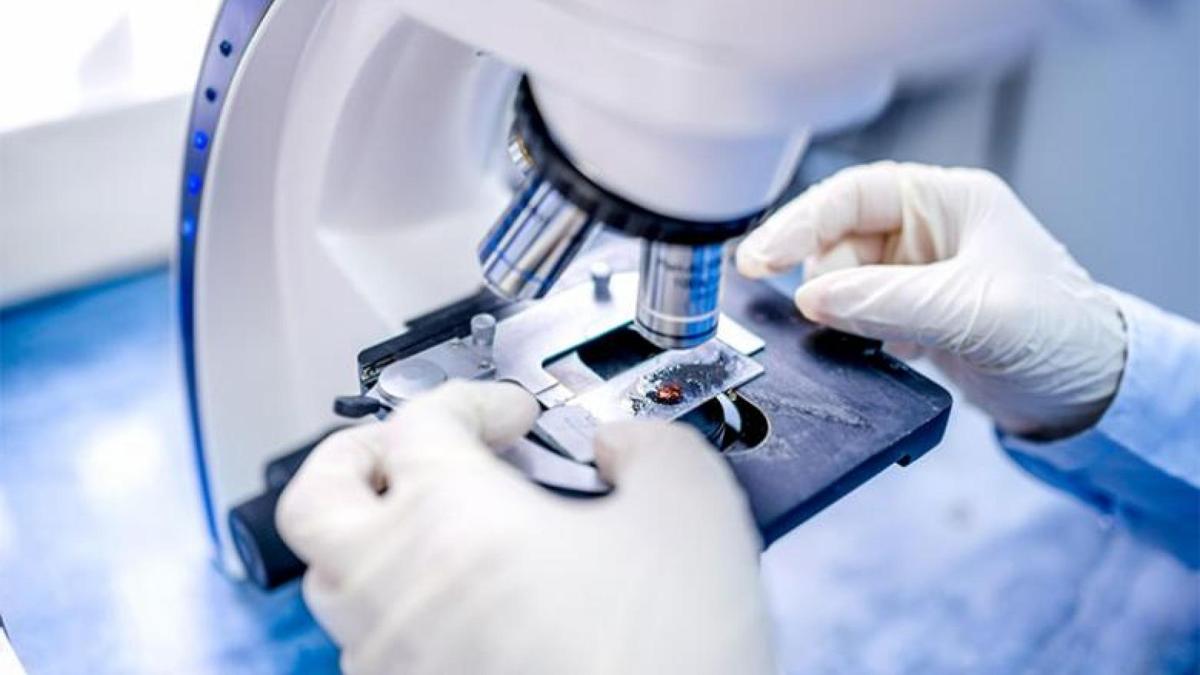
Dr. Jeffrey Stern and Dr. Sally Temple, Principal Investigators and Co-Founders of the Neural Stem Cell Institute, will explain what stem cells are and share the latest updates from clinical trials.
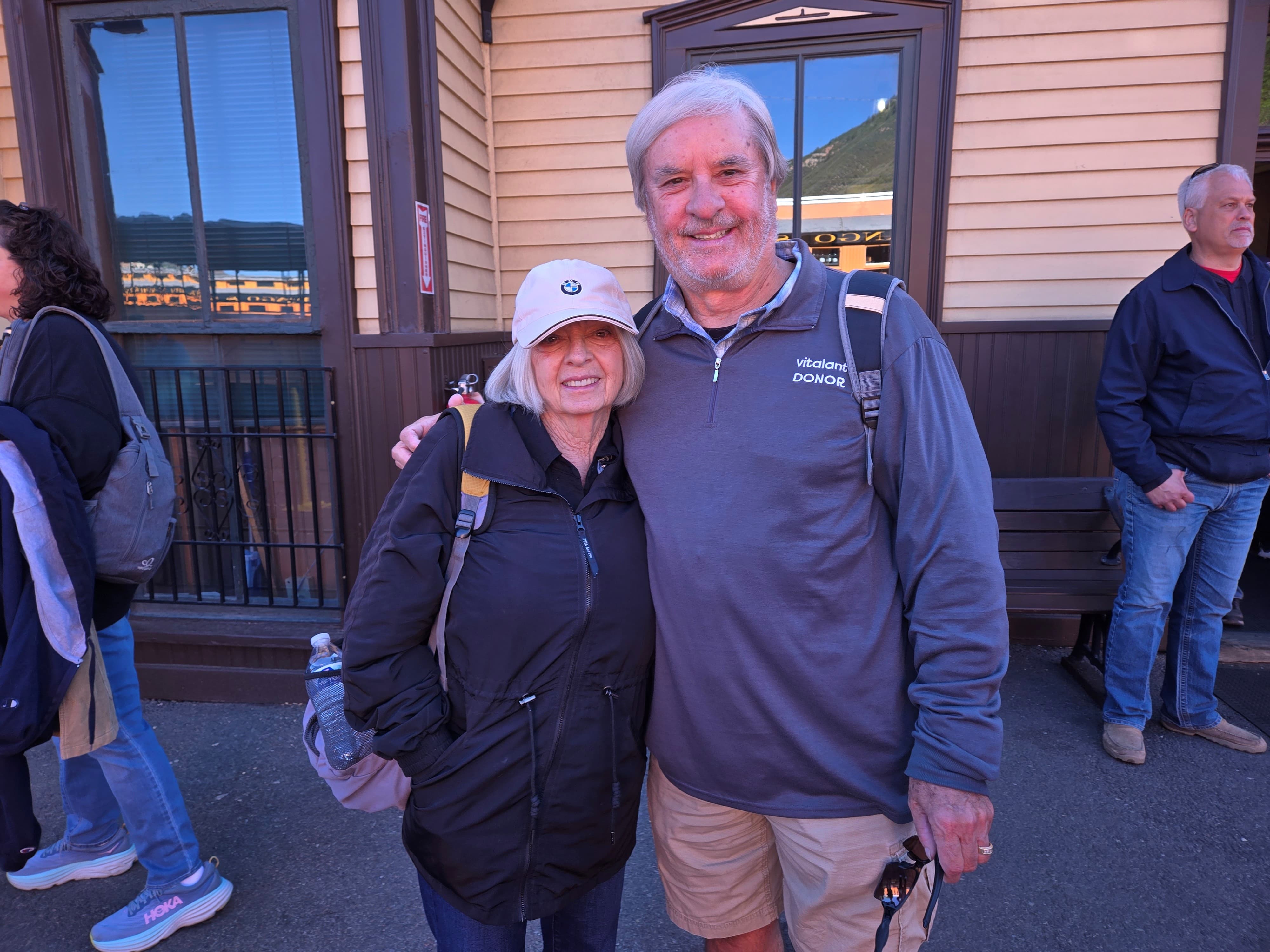
Dave and Leanna Palmer share their commitment to supporting Macular Degeneration Research.

Resources and information that provide products, services, and other support for people with macular degeneration and their families.
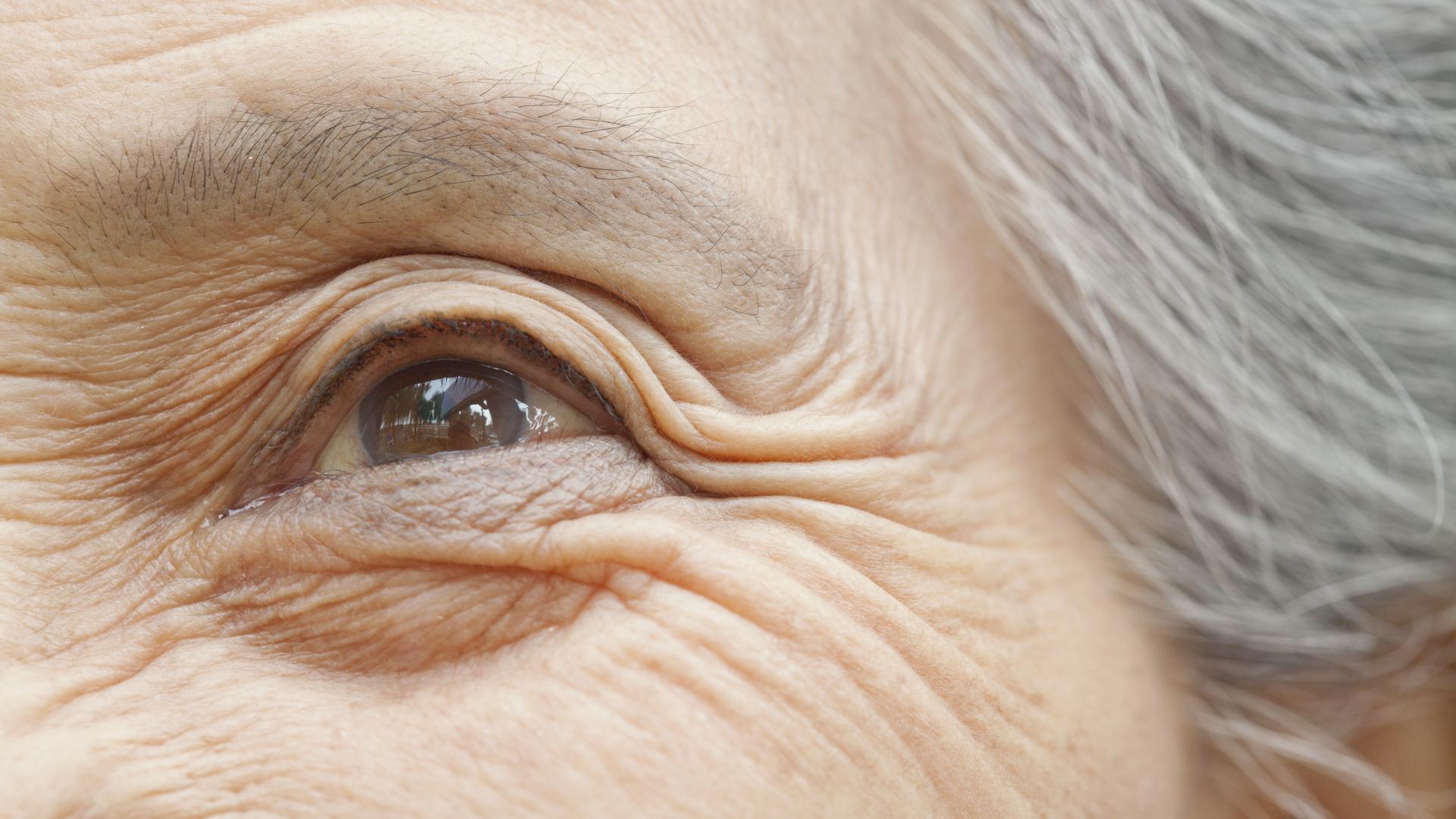
Join Dr. Sara Fard, a retina specialist at Illinois Retina Associates, as she explains the benefits of sustained GA treatment, including slowing the rate of vision loss, protecting retinal tissue, and supporting daily visual function.
Help Fight Macular Degeneration and Save Sight
Your donation helps fund critical research to bring us closer to a cure for this sight-stealing disease and provide vital information to the public.
Donate Today